New car sales to exceed 1 million in 2024, but demand for private electric cars to fall
The new car market has surpassed the one million mark in sales in six months for the first time in five years.
Figures from the Society of Motor Manufacturers and Traders show registrations rose 1.1 per cent in June, taking half-year 2024 sales figures to 1,006,763.
Last month’s increase was fueled by the rise of electric vehicles and fleet sales.
However, Demand from private retailers has fallen across the board. Now the industry is calling on the next government to “reinvigorate the market” by announcing incentives for electric vehicles on the day we go to the polls.
The new car market has surpassed the one million mark for sales in the first half of the year in five years
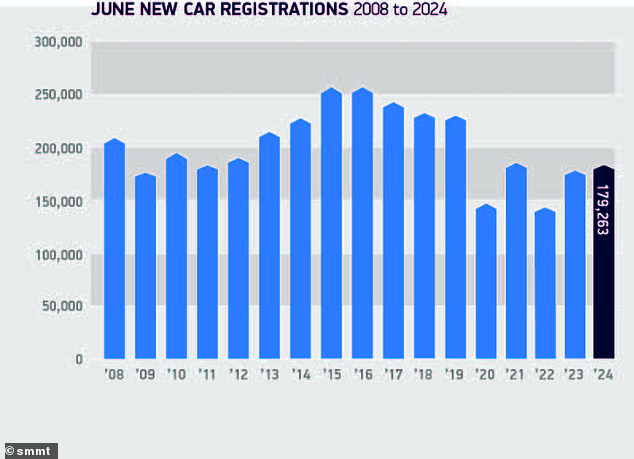
New car registrations reached 179,263 units in June, taking the half-year total above the one million mark for the first time since the pandemic
New car registrations reached 179,263 units in June, taking the half-year total past the one million mark for the first time since the pandemic began.
This is an increase of 6 percent compared to the first half of 2023.
The biggest driver is the 14.2 percent growth in the fleet sector, with a significant increase in electric vehicles.
In June, the number of plug-in hybrid electric vehicles (PHEVs) increased by 30 percent, bringing the market share to 9.3 percent. The number of hybrid electric vehicles (HEVs) grew by 27.2 percent, almost achieving similar growth.
Hybrid vehicles now represent 14.9 percent of the market, while fully electric vehicles (battery electric or BEVs) now account for 19 percent of all new vehicle registrations – the highest monthly share this year.
This 7.4 percent increase in BEV registrations is a positive sign as the UK market continues to move towards electric vehicles.
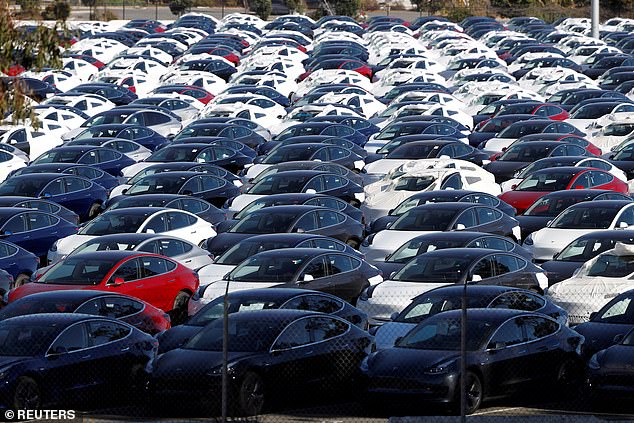
Fully electric vehicles (battery electric or BEVs) now account for 19 percent of all new vehicle registrations – the highest monthly share this year
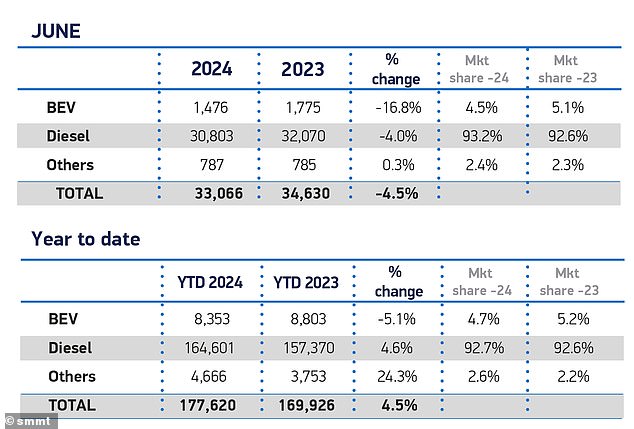
In June, there was a 30 percent increase in plug-in hybrid (PHEV) volumes – to reach a market share of 9.3% – and an almost equivalent growth in hybrid electric vehicle (HEV) volumes of 27.2%
But with the UK electing a new government today, the fall in private sales is causing concern across the sector, calling into question the UK’s move to electric.
The transition currently depends on the fleet sector, as the number of private drivers decreases.
The acceptance of private BEVs is down -10.8 percent year to date. Less than one in five new BEVs goes to private buyers.
The same goes for private sales in general: private buyers account for less than two in five new cars (just 37.7 percent).
This represents a 15.3 percent decline in the number of individual drivers buying a new car, the ninth consecutive monthly decline.
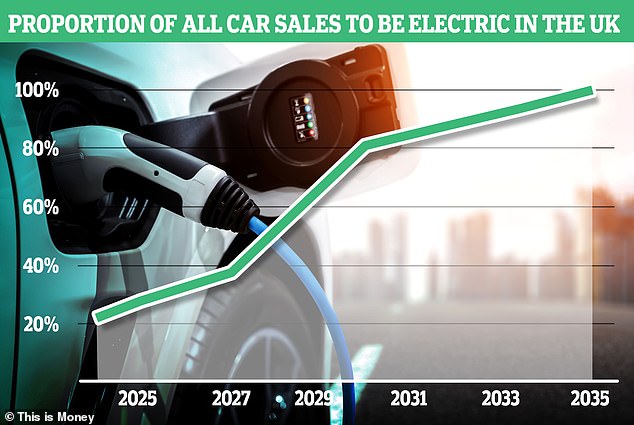
Electric future: ZEV mandate will force automakers to sell increasing volumes of electric vehicles between now and 2035
Automakers are under new pressure to meet Zero Emission Vehicle (ZEV) mandates, with brands required to sell increasing numbers of BEVs each year until a new ban on petrol and diesel cars in 2035.
Only recently did the SMMT reveal that the UK is falling behind its targets, as carmakers are set to miss a key government target for electric vehicle sales this year.
The share of pure battery electric vehicles in the new car market is expected to be just 19.8 percent this year, below the 22 percent required by the ZEV mandate.
While electric cars already account for 16.6 percent of the new car market this year, slightly up from 16.1 percent in the same period last year, this growth still falls short of government-mandated levels.
With Labour expected to win today’s general election, the industry is calling for more support for private buyers on their journey to zero emissions.
Labour has confirmed that the 2035 deadline will be brought forward to 2030. The Conservatives have moved the deadline to 2035.

Mike Hawes, Chief Executive of SMMT, said: ‘With the right policies, the next government can revitalise the market and deliver a faster, fairer transition to zero emissions’
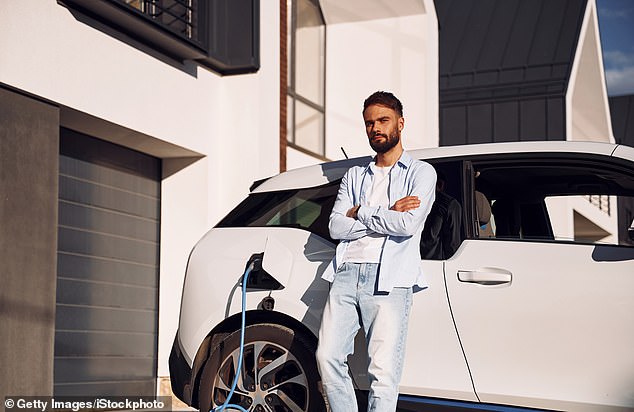
“Retailer demand continues to lag behind fleet growth, making it clear that revitalising the retail electric vehicle market is an urgent issue that must be addressed immediately,” said Sue Robinson, Chief Executive of the National Franchised Dealers Association (NFDA).
Richard Peberdy, Head of Automotive UK at KPMG, said: ‘The industry is closely watching the election outcome and what it means for automotive policy.
‘It is vital that British car manufacturers sell more new electric vehicles. They must now ensure that an increasing percentage of the cars they produce each year are electric.
‘More and more players in the sector are talking about the best way to achieve this. They are thinking, among other things, about stimulating the purchase of new electric cars by consumers.’
Reintroducing tax incentives by halving VAT on BEVs for three years would put an additional 300,000 private BEVs on the road, according to the SMMT. This would ensure that half of all cars in use would be zero-emission by 2035, reducing road transport CO2 emissions by 175 million tonnes.
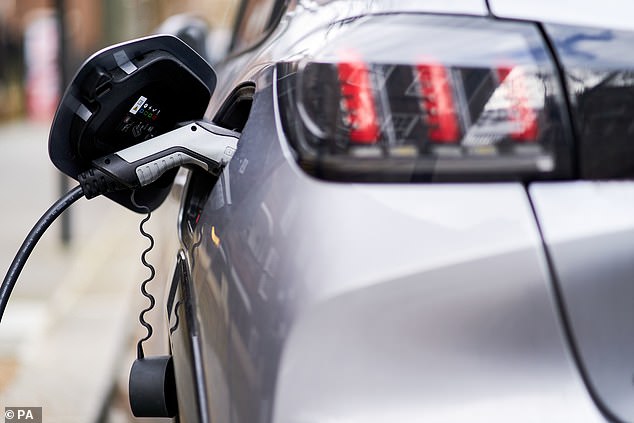
Reintroducing tax incentives by halving VAT on electric cars for three years would put an additional 300,000 electric cars on the road, according to the SMMT.
The SMMT also wants the decision to charge motor vehicle tax on electric vehicles from 1 April 2025 to be reversed and for VAT on public charging points to be reduced to 5 percent (in line with the rate for home charging).
Mike Hawes, CEO of SMMT, said: ‘With With the right policies, the next government can revitalise the market and deliver a faster, fairer transition to zero emissions.
Sue Robinson, Chief Executive of the National Franchised Dealers Association (NFDA), agreed: ‘Retailer demand is lagging behind fleet demand. This makes it clear that revitalising the retail electric vehicle market is an urgent issue that must be addressed immediately.’
Some links in this article may be affiliate links. If you click on them, we may earn a small commission. That helps us fund This Is Money and keep it free. We do not write articles to promote products. We do not allow commercial relationships to influence our editorial independence.
